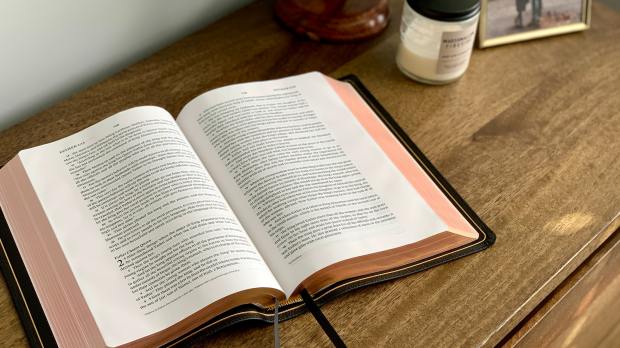Lenten Campaign 2025
This content is free of charge, as are all our articles.
Support us with a donation that is tax-deductible and enable us to continue to reach millions of readers.
Millions more Americans turned to the Bible in the past year than in previous years, according to the American Bible Society. One in four U.S. adults report a more frequent Bible reading habit than was the case last year, the ABS said.
The Society on Wednesday released the first two chapters of their 11th annual State of the Bible report, which highlights cultural trends in the U.S. regarding spirituality and Scripture engagement. The ABS plans to release the rest of the report piecemeal throughout the rest of the year.
“Over the past year, Americans have faced a once-in-a-century pandemic—along with significant political and social unrest,” said John Farquhar Plake, PhD, director of ministry intelligence for American Bible Society. “However, our research shows that in the midst of incredible pressure, Americans are finding hope and resilience in the Bible. This marks the fourth straight year in a trend of Americans moving toward the Bible, with COVID-19 encouraging many of us to look to faith for answers. There’s an astounding opportunity right now for the Church to answer our nation’s pervasive trauma and pain with the hope and healing of God’s Word.”
The findings come from a survey conducted in January 2021, in which data were gathered from 3,354 online interviews with American adults in all 50 states and the District of Columbia, with an additional 91 responses from Gen Z youth.
The first chapter, “The Bible in America,” examines Scripture engagement and key trends around the Bible since the last study in 2020. The second chapter, “The New Normal,” looks at how the COVID-19 pandemic has changed people’s relationships with the Bible and examines the role of the church in helping people read and apply Scripture to their lives.
“Americans are moving forward with muted optimism after a year of stress, frustration, and loss,” the report says. “As they inch into a ‘new normal,’ will they continue reaching for their Bibles for comfort and strength? Will they seek the Lord in prayer in times of stress? Will they find connection in church services, whether online or in person?”
The report looks at how Americans sought to find comfort in the midst of the pandemic, looking at comforts in four main categories: relationship comforts, activity comforts, substance comforts, and spiritual comforts.
“When gathered in these sections, American comforts in 2021 fall in this order: relationship (53%), activity (52%), substance (46%), and spiritual (44%),” the ABS said. “Women are more likely to engage with certain sources of comfort, particularly relational and spiritual sources.
“The most popular comfort choice from all respondents is seeking out a family member (43%), followed by prayer and/or meditation (38%). Food is the third most popular option for the general American population, chosen by one in three (34%). Reading the Bible ranks seventh, overall (23%).”
Black Americans, however, select “reading the Bible” as one of their top three comforts, unlike any other group, the report said. “This reflects Black Americans’ reputation as being deeply rooted in Scripture. Both Black and Hispanic Americans place prayer and/or meditation as their greatest comfort, overall. … White Americans fall between, with prayer as one of their top three comforts.”
The report also found that historically Black and Protestant evangelical churches lead the way in selecting spiritual comforts, “as both prioritize prayer, family members, and reading the Bible as their top three comfort sources.” Mainline Protestants and Catholics still look to prayer for comfort, but second to family members, the report said.
“The emphasis on prayer across all denominations indicates that a large contingent of Americans still seek God in uncertainty and stress,” it continued. “Americans with no religious affiliation—known as the ‘nones’—place television, food, and family atop their comfort lists.”
Other facts uncovered by the research, which was conducted by the Barna Group on behalf of the ABS, include:
- Over 181 million Americans opened a Bible in the past year, which is up significantly from 2020, when 169 million adults used the Bible at least occasionally.
- While virtual interactions and device-dependency increased in nearly every aspect of daily life during the pandemic, six in 10 Americans still indicate they prefer print or paper Bibles.
- Ninety-five million Americans now are “test-driving the Bible,” looking for hope and wisdom.
- Four in ten Americans (41%) either somewhat or strongly agree the Bible, the Koran, and the Book of Mormon are all different expressions of the same spiritual truths. Only one third (32%) see the Bible as unique or distinct from other spiritual books.
- One-quarter of respondents (26%) believes the Bible is the actual word of God and should be taken literally. Three in 10 (29%) hold the view that the Bible is the word of God and, though it does not have errors, parts of it can be interpreted both literally and symbolically. Sixteen percent say the Bible has some historical or factual errors but is still the word of God.
- A slight majority of Americans agrees that Scripture’s message is particularly helpful; 54 percent say the Bible contains everything a person needs to live a meaningful life. This view has fallen significantly since last year when over two thirds of adults (68%) affirmed the Bible as an important source of wisdom.
- Nearly two in three Americans (63%) report their Bible usage is the same as last year, while one in 10 (9%) says it has decreased. One in four U.S. adults (24%), however, reports a more frequent Bible-reading habit.
- Bible users tend to be older. Three in 10 Boomers and Elders (31%) interact with the Bible multiple times a week. Fewer than half as many members of Gen Z (14%) do the same. Less than half of Gen Z are Bible users (43%), significantly lower than both Boomers and Elders.

